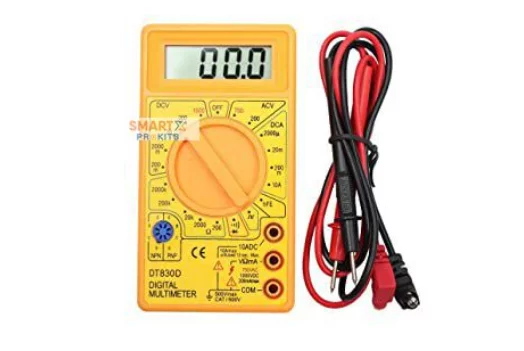The Practical Guide to Types of Multimeters.

Multimeters are like the Swiss Army knives of the electronic world, don’t you think? They measure voltage, current, and resistance, making them indispensable tools for anyone working with electronics. There are mainly two types: analog and digital multimeters.
- Analog Multimeters:
- Display: They have a needle that moves along a scale.
- Pros: They are great for quickly changing values as the needle responds smoothly. Some people find analog displays easier to interpret.
- Cons: They can be a bit less precise and may not have as many features as digital
- Digital Multimeters (DMM):
- Display: Numeric readout on an LCD screen.
- Pros: More accurate and often have additional features like auto-ranging and data logging. The display is typically easier to read.
- Cons: Some people find the digital readout less intuitive than an analog display.
- Auto-ranging vs. Manual-ranging:
- Auto-ranging: The multimeter selects the appropriate range for you.
- Manual-ranging: You have to set the range yourself. Manual-ranging can be more time-consuming but gives you more control.
- Specialized Multimeters:
- Clamp Meters: Measure current without disconnecting the circuit.
- True RMS Meters: Provide accurate readings for both sinusoidal and non-sinusoidal waveforms.
- HVAC Multimeters: Include features like temperature measurement for HVAC applications.
- Fluke Multimeters: Known for their quality and durability, often used in professional settings.
- Basic Functions:
- Voltage Measurement: Measures electrical potential difference (Volts).
- Current Measurement: Measures the flow of electric charge (Amperes).
- Resistance Measurement: Measures opposition to the flow of electric current (Ohms).
- Continuity Test: Checks if a circuit is complete.
- Safety Features:
- Fuse Protection: Prevents damage in case of an overload.
- Overload Protection: Safeguards the multimeter from excessive input.
- Usage Tips:
- Set the Range: Choose the appropriate measurement range.
- Start with a higher range: Begin with a higher range and work your way down for more accuracy.
- Safety First: Follow safety guidelines, especially when dealing with high voltage.
- Calibration:
- Regular Calibration: Ensures accurate measurements. Some multimeters come with a calibration certificate.
Remember, choosing the right multimeter depends on your specific needs. Whether you’re a hobbyist or a professional, having a reliable multimeter is key to troubleshooting and maintaining electronic systems. Anything specific you’re curious about?



















